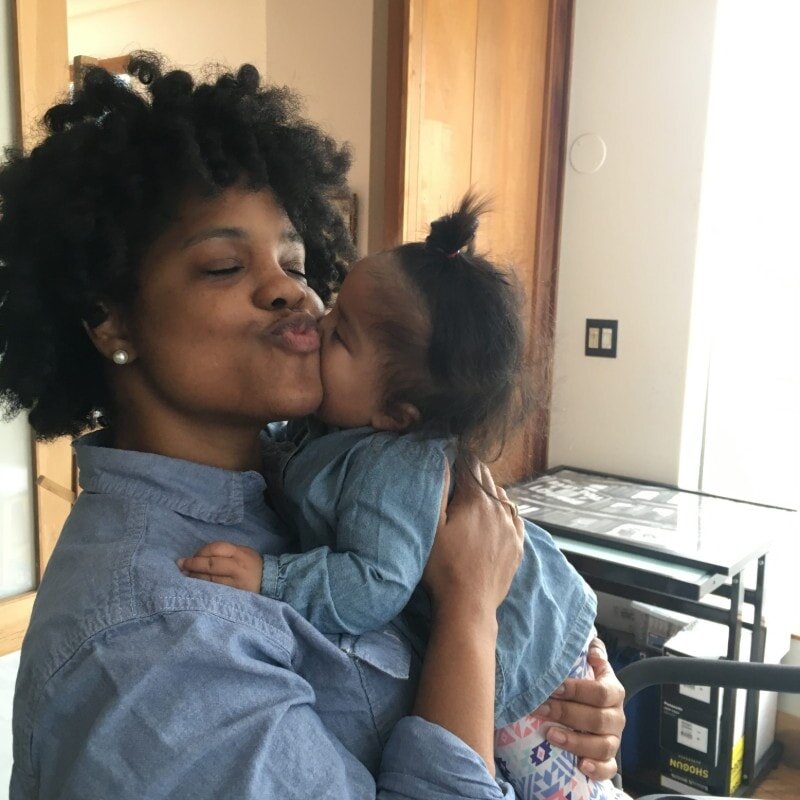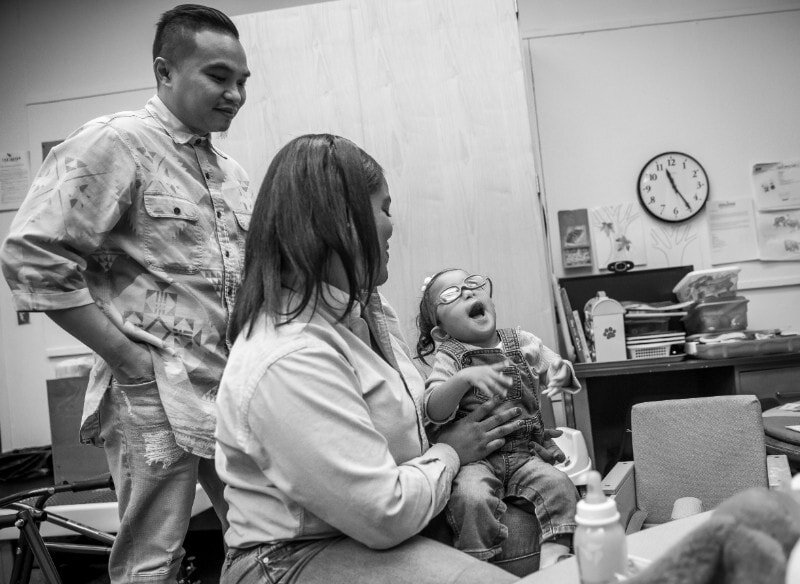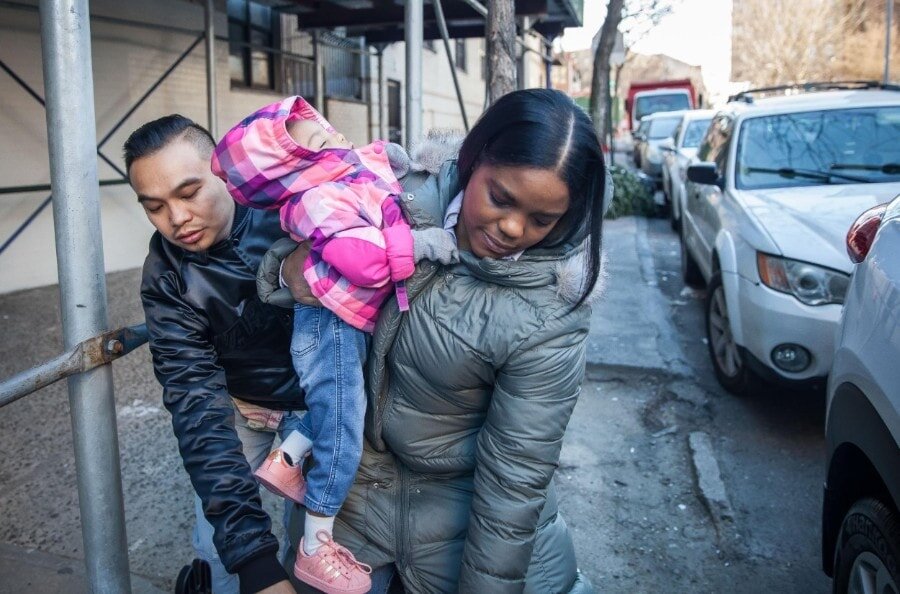Lia McPherson was 20-weeks pregnant with her daughter Phoenix when doctors told her and her boyfriend Jeremy Bautista that their baby had a cleft lip and heart defect. But they couldn’t tell the first-time parents if those were Phoenix’s only health issues, or if they were symptoms of a much larger disorder. It marked the first of many battles Lia would face as a special needs mom.
It would take months after Phoenix was born (she spent 8 days in NICU and 22 days recovering from open-heart surgery) before Lia discovered the answer for herself: Phoenix has CHARGE syndrome, a collection of several abnormalities that affect different parts of the body.
Getting Phoenix diagnosed with CHARGE was a major step in getting her the care she needed. For Lia, it was a validating continuation of what she’d always done since her daughter was born: Be her biggest advocate.
But being a parent to a child with disabilities comes with its own set of joys and challenges that not many people understand.
In the final part of our interview, Lia explains the ins and outs of being a special needs mom and raising Phoenix—from crazy copays and commutes to the love she gets from her daughter and their CHARGE community.
Editor’s Note: This article is from 2019. Since publishing, Phoenix has become a big sister: Lia, Jeremy, and Phoenix welcomed a new baby girl to their family.

How would you describe Phoenix?
She’s an itty-bitty. We call her a warrior, but I don’t even think that describes her. She’s just like a firecracker!
She can’t talk. She’s not walking yet. She hit a lot of these mobility milestones, like crawling and pulling to stand at about 18 months, but she gets around. She now has a medical assisted walker. She doesn’t know as much sign as we’d like, but she’s telling us she wants her milk and her bottle. She’ll imitate the signs; she loves the horsey sign and the butterfly sign.
She has this laugh—I think her laugh is similar to mine ’cause it’s just loud and obnoxious, and it just cracks you up. She has so much hair for her to be a 2 year old.
Everybody who is around her just loves her so much because she’s so sweet. And she’s just the most chill baby you’ve ever encountered. She’s a problem solver, that’s what she gets from both me and Jeremy. Whenever she’s frustrated about something or feels like something is in her way, she figures it out.
When people say, “How can I help?” or “What can we do?”, we just really encourage other parents to teach their kids early about kids who have differences. It really feels good to be in spaces and to not explain what’s going on with your kid, or explain the differences they have, or to just feel included and not feel different.
We haven’t really had to go through that yet with Phoenix, but we’ve felt excluded as parents. Sometimes other parents won’t invite us to things because they think Phoenix won’t benefit, or we have to spend a lot of time explaining her situation.
We like to educate people, but sometimes we just want to be at a party and be at a party.
What were some of the costs associated with Phoenix’s care?
It took us a long time to be approved for Medicaid because we’re both working. But since she’s considered disabled, we were finally able to get the Medicaid waiver for kids with disabilities.
At first though, it was crazy. I literally don’t know how we were paying for cabs back and forth to the doctor, and paying these crazy copays. The highest one we ever had to pay was for her lip retainer. It was like $4,000 because the doctor didn’t take insurance. We put it on a credit card and got some scholarship through the hospital that brought it down to $2,500.
The insurance eventually reimbursed us. The copays were like $150, $200. Something that an artist can’t afford. It was like, “Thank God, this Medicaid finally kicked in.”

What’s it like balancing work while being a special needs mom and raising Phoenix?
Since 2015, I’ve been working full-time as an HR manager. Jeremy was still performing as an actor. We met because he had this really great one-man show that he was doing. He was able to make a decent living from doing college tours of that show.
We were being artists and not caring about being super broke. But once we had Phoenix… Around 8 months was when we started realizing shit is real. Jeremy stopped the show and all the other freelance gigs he was doing and he got a full-time job. He’s a theater manager now, which has made all the difference.
My job is crazy, but they have been so understanding. When I was pregnant, I had to really paint a picture for them because I don’t think they really got it. They were like, “Oh, well, you’ll be lucky if you get six weeks. It’s a small company. The other woman who was pregnant, she came back after two weeks. All the dads got two weeks.”
It’s just really that support and ‘finding your tribe,’ as they say, that’s really helped us navigate and figure out things
I was like, “Let me tell y’all something. First of all, y’all shouldn’t be telling people anybody came back two weeks after giving birth. That’s ridiculous. Secondly, New York State is about to pass this law that makes it mandatory to a) give me maternity leave and b) for it to at least be six weeks. So jump on board before you get left behind, and my kid is about to be born with all these issues!”
My manager at the time was like “Uhhh, I don’t know…”
But when I put it in writing in an email and I was like, “Look y’all better stop playing. This is a progressive company. We’re a film company that works on documentaries about social justice. Are y’all crazy? Do you know how bad this’ll look?”
Once I put it into that framework, the owner called me immediately.
“I don’t know what she said to you, but I don’t want to give the impression that this is what I want!” he said. “I understand that you’ll be going through a lot!”
Luckily everything turned out really great. They gave me 12 weeks paid maternity leave, which was amazing because I was able to be home with her for three months. And once I got back, they were like, “Listen, we know. We’ve seen you going through these surgeries already—whatever you need.”
Now I work part time. They still bug the hell out of me via email when I’m not there, but I’m able to work from home.

How has CHARGE affected your life?
They have found that Autism moms suffer from PTSD, and I definitely feel like me and Jeremy have some sort of PTSD. Our little family unit has a lot of stress, but we’ve also just become so much closer. Jeremy still annoys me when it comes to dishes, but all three of us now have this connection that’s sort of insane.
When you have all of these encounters with medical professionals, you realize that you have to be the biggest advocate for your kids. Some of these doctors may not have that much experience with the syndrome. Or they may be getting kickbacks from these companies, so they might be pushing things on you that you don’t need. Or they may underestimate your kid, so they don’t really give you that attention that you need.
Since she’s been born, she’s had these issues with feeding. From the time she was released from the hospital they had me fortify my breast milk with formula to make it higher calorie so she could gain weight. I had to exclusive pump because of her lip; I was pumping around the clock.
She had a G tube placed when she was 5 months old. But even though Phoenix has a G tube, she hasn’t been depending on it. I started to do some research because they wanted to transition her from fortified breast milk to just formula, even beyond 1 years old.
We like to educate people, but sometimes we just want to be at a party and be at a party.
I said, “No, she’s 1. She should be having food. And even if that’s not through her mouth, we need to figure out a way for her to have real food.”
It actually wasn’t a second thought for me. I just started mashing or blending up food and putting it through her tube. Just like any other 1 year old. “Oh, let’s try bananas, let’s try peas,” but I was putting it through the tube not realizing there’s a whole movement about putting real food through the tube.
I found this group and it was actually very helpful. I started blending her food, but made sure it was high-calorie food because she’s really small and she has to have a lot of calories. She either takes it as a puree with a spoon, or we give it to her through the bottle. The only thing she uses the tube for now is water, because she has silent aspiration so a little bit of food or water might go down the wrong way. Anything that’s too thin, she can’t drink.
Our days are filled with me blending food, having that all prepared for a week or two, going to therapy sessions, and then on occasion we may go to a party or we may hang out. I felt like it was important for us to still maintain some sort of normalcy.
Because we’re able to fit in these little things here and there, it looks like, “Oh, this is a walk in the park!” [Laughs] People come by and visit, and they’re like, “Oh, your house is clean!” And it’s like, “Girl. You don’t even know.” [Laughs]

What does care look like for her?
That was part of the trauma with Jeremy. He didn’t want anybody to watch her. He was still thinking about the hospital and her care in the hospital and us being the ones who knew how to do everything—administer the medicine, give her food, all this stuff.
We finally had to buckle down. We got a babysitter last summer, so it had been 18 months of it just being us. I said, “We have to. I’m going crazy, I’m losing it, I can’t do it anymore. We need help.”
Since she turned 1, I’ve gained 40, 45 pounds. I said, “Jeremy, you have to stop being scared of somebody else watching her.”
But it wasn’t just him, it was also getting all this paperwork approved. Medicaid sends you mounds of paperwork to fill out to explain your child’s needs, your pediatrician and specialists have to also sign off. Then you have to have a nurse come out to your home to confirm what you explain in the paperwork.
We just didn’t stop at “Your kid will never see.”
Once the Medicaid was approved, we were like, “Do we get a nurse, do we get a babysitter, what do we do?”
We’ve been fortunate. We got past the vision, hearing, and the heart diagnosis, and she doesn’t have breathing issues or need to take a lot of medicine.
So the Medicaid waiver coordinator said, “Listen, you guys can’t pick a nurse. The nurses are chosen for you. Phoenix doesn’t need round-the-clock care like a lot of other CHARGE kids, so why don’t you guys do CD-PAP?”
CDPAP is the program run by Medicaid/the State that pays for our babysitter. It was great because I was like, “You can’t pick the nurse? I don’t want just want any old nurse coming up in here.”
So we found a caregiver. She comes three times a week. She’s in our house 25-30 hours a week. I work part time, so I’m there the other two days. She’ll also take over a date night.
Just her coming in for those three days is just so helpful. Like Tuesdays, for example. We live in the Bronx. Phoenix goes to school for sign language for an hour in Queens. Then we leave Queens and drive to White Plains [a New York City suburb] for aqua therapy. Then we leave White Plains, we come home for speech therapy and I’m wiped out by then. But the day is still going on, there’s still playing with her and keeping her stimulated, feeding, and all these other things that come with being a mom. And it’s exhausting. And I still clean the house and I still cook.
How do you navigate being a special needs mom and all of this?
I have a pediatrician who’s great. When you have a kid with special needs, a pediatrician can kind of be a glorified person who takes weight and gives shots, but she’s been supportive. She’s like, “If you think this is going on, alright, let’s go get it checked out.”
I would emphasize, especially as people of color, that if you get an opinion that you don’t like you don’t have to take it as law. They don’t have the final say. Like that woman who said that Phoenix would never, never, never… We were like, “Ok, you’re not it. Let’s get a second opinion. Let’s get a third opinion.”
And that’s what we did. We just didn’t stop at “Your kid will never see.”
You should also seek out these groups. If it was not for these groups, I swear to you, we would not be as far as we are with Phoenix. The doctors don’t know shit. Sorry to say, but they don’t know.
I wouldn’t have known that I don’t have to listen to these doctors and not give Phoenix formula. I wouldn’t have known about this microphthalmia, [an eye disorder that makes one or both eyes abnormally small], because it just didn’t come across anybody’s radar. I could clearly see her eyes were different.
She’s only 2, so I’m still on these groups and I’m soaking up so much information. We went to the genetics counselor and learned about CHARGE, but she still didn’t tell us that she may be missing her olfactory bulb, which is her sense of smell. It hasn’t been confirmed, but we believe it’s likely because the percentage of kids with CHARGE missing the olfactory bulb is about 42%. She also prefers things with really strong tastes, which is a sign of an olfactory deficit.
It’s just really that support and “finding your tribe,” as they say, that’s really helped us navigate and figure out things that doctors just wouldn’t have been able to do for us.
What resources have been especially helpful for you as a special needs mom?
It’s really been other moms. This mom and I got connected through Phoenix’s vision therapist.
People come to me and they say, “I don’t know how you do it.” And I hate when people say that because if you had a kid going through what our kid was going through, you’d figure out how to do it. I don’t have a superpower.
But I do not know how this woman does it. Her first son also has CHARGE. He’s 10 or 11 now. She now has two other kids, and she goes to all of these appointments for her other kids. She is just a wealth of knowledge. She was the person who pointed me in all the directions I needed. She was the one who sent me to the Lexington School for the Deaf. She had me sign up for the State Deaf Blind Initiative. She just sent me to every place I needed to be in.
What advice would you give other special needs moms?
You get hit with all this “bad news” all the time, and you’re just like, “Shit, when do I come up for air?” But I would say never stop believing in your kid and their abilities. Even if their abilities are different from other “typical” kids, never stop believing in their potential. This is something I tell myself on a daily basis.

















